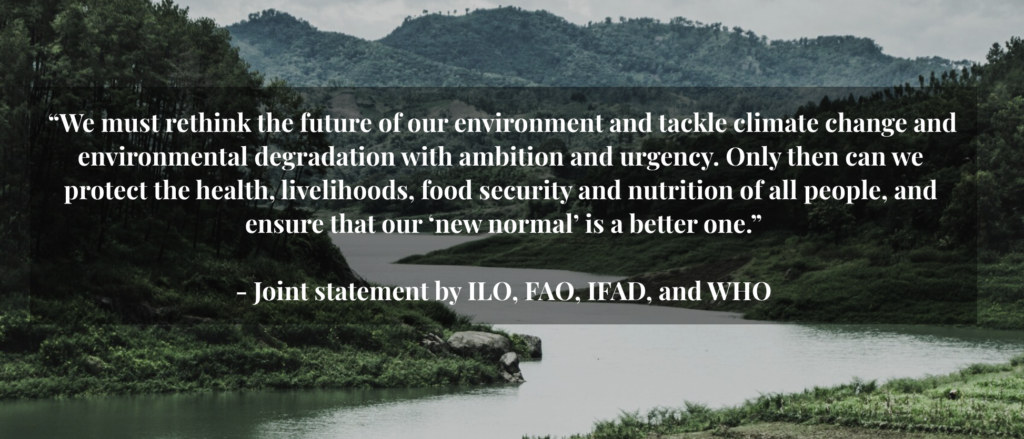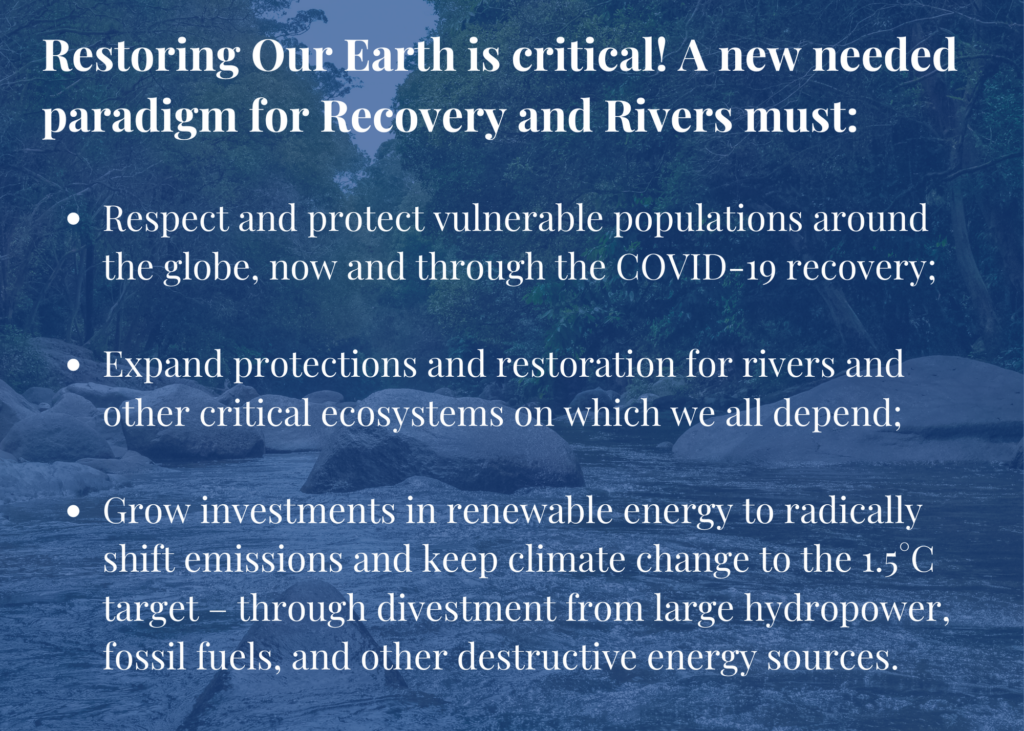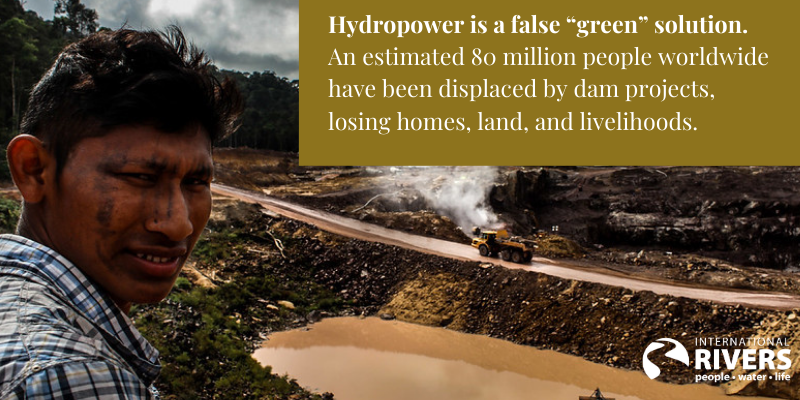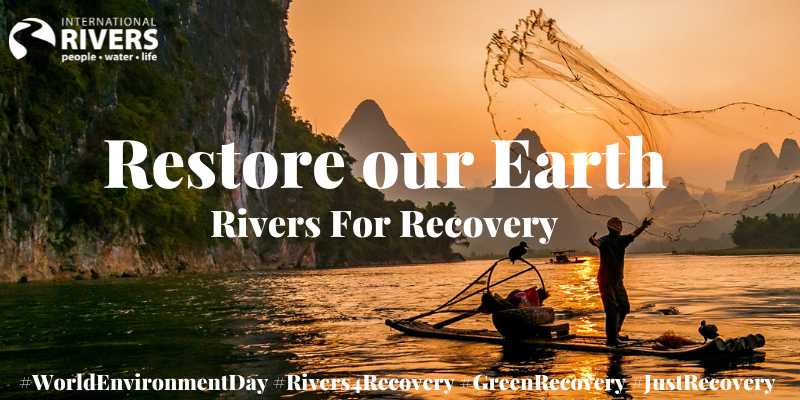This year, Earth Day and UN World Environment Day both focus on restoration, for good reason; 97% of Earth’s land area may no longer be ecologically intact. If we don’t urgently make recovery and investment choices that change course, our ecosystems, and humanity itself are on a path to collapse.
We’re facing multiple crises: a global pandemic, struggling economies, climate change, and massive biodiversity loss.
The COVID-19 pandemic and the resulting public health and economic crises continue to devastate populations around the globe, affecting marginalized and vulnerable groups most acutely. From the Brazilian Amazon to the United States, many Indigenous peoples, tribal communities, and minorities were and are falling sick and dying of COVID at rates that exceed those within the general population. COVID-19 has both exposed and exacerbated the human rights threats and vulnerabilities already faced by many communities.
Communities around the world face existing water access challenges and energy poverty. As of 2019, 17 countries and nearly 25% of the world’s population faced severe water scarcity. By 2050, researchers predict that up to half the world’s population will live in water-stressed areas.
The massive, transformational shocks these crises have produced for our current economic, energy, and food systems require an equally transformational response. We need to address widespread economic collapse, hunger, unemployment, and environmental damage, centered in concerns for social justice and ecological integrity.

Protecting rivers protects us and the planet
Rivers and freshwater are crucial in addressing the current global challenges of climate change and accelerated biodiversity loss. Rivers act as arbiters of the world’s carbon cycle, transporting CO2 from the atmosphere to the ocean – a vast carbon sink that contributes to mitigating climate change. Rivers are vital for conserving and sustaining wetlands, which house or provide breeding grounds for around 40% of earth’s species, and store vast amounts of carbon. Wetlands also provide protection against floods and storms and help delay the onset of drought, supporting community resilience to climate change and natural disasters.
Rivers and freshwater ecosystems are vital to a post-COVID global economic recovery. They underpin our natural systems, provide critical ecosystem services, and work as an economic safety net for the poor and vulnerable in many low- and middle-income countries. Freshwater ecosystems provide billions of people globally with water, food, and livelihoods security. In the Lower Mekong Basin, for example, the world’s richest freshwater fishery constitutes the primary protein source for 65 million people.
Yet freshwater ecosystems are among the world’s most degraded and are currently under threat as never before. For generations, these arteries of the planet have been dammed, diverted, and polluted at a catastrophic cost to people and Earth’s living systems:
- Over 70% of the world’s large river systems have been dammed and diverted, and no longer flow freely.
- Water pollution is on the rise. Some 80% of the world’s wastewater is discharged – largely untreated – back into the environment, polluting rivers, lakes, and coastal areas.
- One in three freshwater species is now threatened with extinction. The last 50 years have seen an 83% decline in freshwater species and the loss of 30% of all freshwater ecosystems.
- An estimated 64–71% of natural wetlands have disappeared over the last century due to human activity.
We must urgently rethink the ways we exploit our finite natural systems and the ways we value and protect them. Water – essential to life on earth – is fundamental.
Healthy ecosystems sustain resilient communities
With the COVID-19 pandemic, this is more evident than ever. As decreased consumption, tourism, and investment have weakened economies and spurred unemployment, access to river resources has provided a critical safety net for many local communities as a source of food, livelihoods, income, and well-being, and as a central pillar of recovery. Communities with access to natural resources, healthy ecosystems, and sustainable food production have demonstrated greater resilience in the context of the crisis. Functioning rivers that support productive fisheries and agriculture will play a critical role in the global economic recovery, delivering food to national and global supply chains and income to local farmers and businesses.

A New Paradigm is Needed for Recovery and Rivers
A new paradigm in river stewardship is critical, not only to safeguard the water sources that are indispensable to life and public health, but to help prevent countries bankrupted by COVID-19 from taking on calamitous new debt, speed a just energy transition, and effectively confront the climate crisis. The current push to escalate dam-building in many low and middle-income countries threatens such progress—a false energy solution that the hydropower industry is promoting under the guise of a “green” economic recovery.
Hydropower dams are a false solution
A false path to economic recovery is one that expands crippling debt for countries already struggling under massive debt burdens, prioritizes “green-washed” solutions that divert scarce funds away from better alternatives, promotes large centralized grids designed around destructive projects, such as mega-dams and fossil fuels, weakens environmental and social safeguards, and continues the abuse of our freshwater resources.

Damming Rivers Is Terrible for Human Rights, Ecosystems and Food Security. Hydropower dams carry extremely high environmental and social impacts—they are a false solution and cannot deliver a green recovery. By comparison, investments in solar and wind technologies are affordable, quickly deployable, and can deliver jobs cost-effectively in the economic recovery. In order to rebuild towards a better future, economic stimulus packages should invest in low-impact technologies and those that benefit vulnerable populations and ecosystems, prioritizing community rights and participation rather than bailing out destructive industries that are rapidly losing relevance and financing.
The Rivers for Recovery report details, despite the rhetoric of the hydropower industry, the industry’s global flagship projects continue to prove poor investments. This in addition to destroying critical ecosystems and biodiversity, while devastating local populations, human rights, and food security.
We call for a recovery that is rooted in climate justice and protects our rivers as critical lifelines—supporting biodiversity, water supply, food production, Indigenous peoples, and other culturally diverse populations around the world –- rather than damming and polluting them in pursuit of profit and economic growth.
We call for a green economic recovery that includes:
- A moratorium on new hydropower dams as an essential step towards a sustainable and just economic recovery. This should be accompanied by a comprehensive review of energy systems and pipeline projects to ensure priority to protecting freshwater ecosystems and the community livelihoods and economies that depend on them.
- A rapid upscale of investment into non-hydropower renewables and storage, together with policies to facilitate socially and environmentally responsible investment. Investment should kickstart renewable energy projects, roll out centralized and distributed connectivity, build jobs, and deliver low-cost and low-impact electrification to those experiencing energy poverty. Governments can use subsidies and grants to foster upstream value chain investment in local renewable energy manufacturing and assembly.
- Upgrades to existing hydropower projects to increase efficiency instead of building new dams. This can include retrofitting turbines, improved pumped storage, and grid-integration with wind, solar, and other energy innovations. Upgrades should be accompanied by concrete steps to reduce damage to freshwater ecosystems and local livelihoods through robust mitigation compensation, and reparations. Dam removal and river restoration should be undertaken when the adverse social and environmental impacts of existing dams cannot be effectively mitigated.
- Investment in green infrastructure that protects and restores freshwater ecosystems and biodiversity, alongside laws governing freshwater protection. To ensure priority to ecosystem services and job opportunities for local communities, facilitate dialogues between government, private sector, and Indigenous and community water users. Green infrastructure and renewable energy investments must be in line with international human rights standards and environmental safeguards , including the right of Indigenous peoples and other traditional communities to Free, Prior, and Informed Consultation and Consent.
- New energy development plans that emphasize investment in energy conservation and efficiency, participatory demand-side modelling, and options for smart, distributed energy and mini-grids located close to energy sources and end users, with a focus on community grids and expanded energy access. Governments should halt expensive and long-timeline hydropower projects to review and update energy plans and reassess options for electrification, ensuring transparency and public participation at all stages of planning and implementation.
- Safeguards for protected areas in stimulus and recovery plans. This includes adopting policies supporting “no go” zones for environmentally destructive investments in protected areas, endangered and vulnerable species habitat, free-flowing rivers, and the territories of Indigenous people and other traditional communities. Identify and halt destructive uses and development pressures on protected areas. Instead of backtracking on existing legislation, governments should strengthen policies to protect rivers, biodiversity and people’s rights.
Conversely, we argue that a false path to economic recovery includes:
- Expanding crippling debt for countries already facing economic crises due to COVID-19
- “Green financing” that prioritizes “green-washed” solutions.
- Large centralized grids designed around destructive projects.
- Ongoing abuse of our freshwater resources.
- Weakening of environmental and social safeguards and regulations
Protect #rivers and #rights as essential for a #just and #green recovery:

